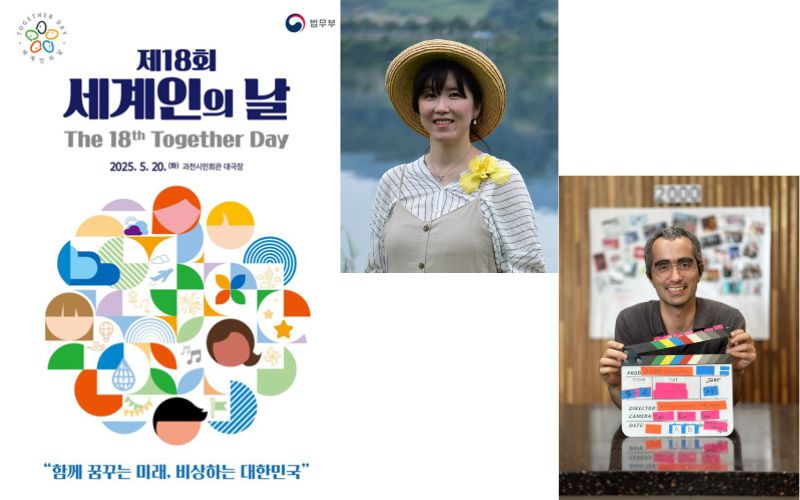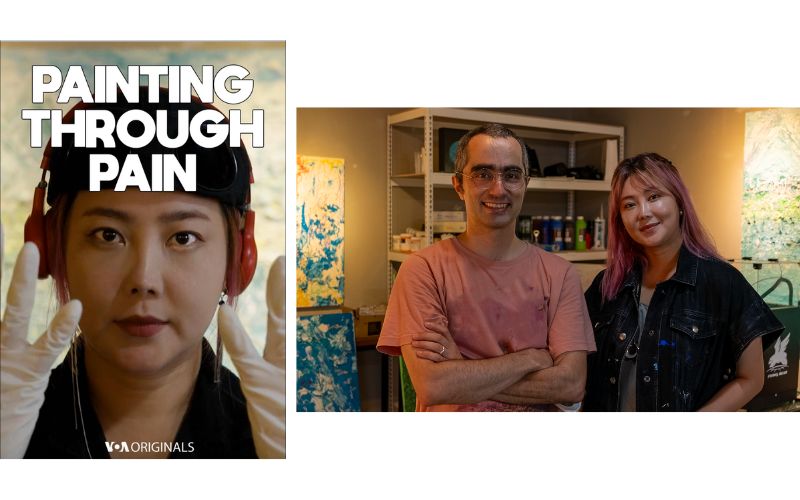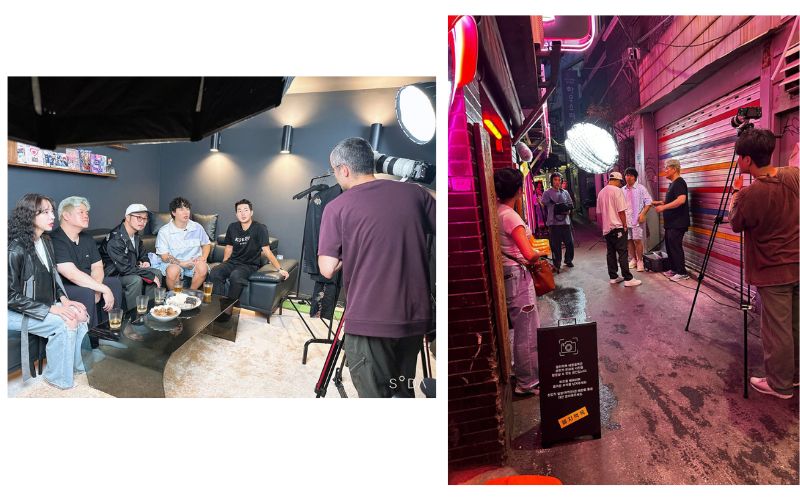In 2007, the Ministry of Justice of the Republic of Korea enacted the "Framework Act on the Treatment of Foreigners Residing in the Republic of Korea," designating May 20th as "Together Day." This day was incorporated into the national calendar as a celebration, supporting the country's immigration policies and initiatives for multicultural coexistence. The week beginning with Together Day is recognized as Together Week. The purpose of this designation is to create a society where Koreans and foreigners in Korea respect each other's culture and traditions and live in harmony. This year, the 18th Together Day will be celebrated with the slogan “A future we dream together, a soaring Republic of Korea” throughout Korea. (sources: Korea Legislation Research Institute website, Together Day website)
On this occasion, I conducted a voice-call interview with Komeil Soheili and his wife, Kim Joo-young, an Iranian-Korean filmmaker couple. The interview took place in Iran from May 14 to 18.

Komeil Soheili is a filmmaker, writer, and lecturer from Iran. After graduating in cultural studies and media at the University of Tehran, he has done professional film courses in Indonesia and Korea. He has served as a jury member at prominent international film festivals, including the Busan International Short Film Festival, Aladerri Short Film Festival, Meihodo International Youth Visual Media Festival, and Lampa Film Festival. His works have been nominated and won awards for international film festivals, including the Guangzhou International Documentary Film Festival (GZDCS), Bucheon International Fantastic Film Festival, and Meihodo International Youth Visual Media Festival. Soheili has also worked with different broadcasters, and his documentaries stream on various platforms: National Geographic, BBC, VPRO, CCTV, and Business Insider.
Kim Joo-young graduated from Sejong University's Department of Cartoon and Animation. She has worked on various short animations and TV series, and began her journey into documentary filmmaking in 2019.
Komeil Soheili and Kim Joo-young have produced several works on the environment, social issues, culture, art, and music, which have been screened at numerous festivals.
Naming a day and declaring it a national holiday can, over time, create public awareness about it. When public awareness is developed, public demand is raised that can influence the policies and laws of relevant organizations and institutions to achieve the goals of that naming. Noting that such designations are a sign, Komeil Soheili said: “Such designations are more of a sign than a goal. Perhaps naming a day alone may not have a significant impact on society, but it can identify and introduce the intended path for it, and make society curious about that issue and goal.”
Referring to the importance of the role of a country's geographical location and historical background in creating cultural interactions and accepting multicultural diversity, he said: "Korea is a peninsula and compared to some other countries, such as countries along the Silk Road, it has had more limited communication routes, which has led to it not having much experience in interacting with other cultures in the past. However, its entry into the modern world and its location among advanced countries have given it an international face, which has led to us now being able to see immigrants in various cities such as Seoul who have come here for marriage, education or work, and seeing them daily has become a normal part of life in the capital. This shows that society and the law are accepting cultural diversity and mutual understanding. As a democratic society, Korea has aimed to take steps both socially and legally to reduce discrimination. For example, we can mention holding language training courses and cultural events for immigrants."

However, it seems that there are still challenges regarding refugees. Komeil Soheili, stating that Korea has the lowest number of refugees among industrialized countries, referred to the challenges related to refugees in the past. Said: “Due to the geographical and historical conditions previously mentioned, Korean society does not have much experience with refugees and interacting with them. However, the phenomenon of globalization in recent years and the increase in the number of immigrants coming to education and work have raised social awareness on this issue, and it seems that society is also taking steps to accept cultural diversity in Korea.” In this context, Komeil Soheili has made a short film titled "The Little Plant," which focuses on immigration and cultural adaptation.
This Iranian director considered correct mutual understanding to be the most important factor for creating cultural harmony and interaction, and said: "Lack of correct and proper understanding can cause many misunderstandings. Relying on limited sources, such as news and media, and some works of art produced in specific countries, such as some Hollywood films, cannot provide us with correct information. Researching, listening to the music of different nations and cultures, and reading the works of various authors from around the world can help us achieve correct mutual understanding and comprehension."
Komeil Soheili traveled to various countries around the world for 5 years and finally chose Korea to continue his life and artistic career. Referring to the significant differences in the way different societies view immigrants, he shared his observations and experiences: “I traveled to various countries, given the experience I gained from these trips, I chose Korea to continue my professional career. In European and American societies, there is a top-down and discriminatory view of immigrants. But I saw this attitude much less in Korean society. As an Iranian director who has been working in Korea for years, I have not encountered any restrictions from society or the law. My rights as a free person have always been respected. Even when I was working on sensitive issues and making films, no institution or organization prevented my activities. And I was always respected as a filmmaker and artist. And this shows that in a democratic society, both the law and society are supporting such constructive interactions and moving in this direction. Of course, this understanding varies in different places. But I personally was respected everywhere, which shows that there are sound legal foundations.”

He considered the experience of naming “Together Day” as a valuable experience that could be used as a model in other countries. "The idea of dedicating a day to those who come from somewhere else is very attractive. And it can have good achievements anywhere in the world. We live in an era when all countries are faced with the phenomenon of migration to a greater or lesser extent. The presence of such a day in the calendar of every country that can bring respect for cultures, customs, and traditions will lead to constructive interaction."
Kim Joo-young, stating that Korea has changed very quickly internationally and that there are more international couples living in Korea today than ever before, said: "However, living as an international couple is still somewhat challenging. Of course, I don't want to say that this kind of thinking is everywhere, but there are still those who expect or wish to make friends with more people from Europe, or English-speaking countries, and assume that international couples are white Caucasian, not Asian. They also feel closer to people from Northeast Asia."
Emphasizing the importance of presenting a true image of other cultures and their impact on the children of international couples, she continued: “As an Iranian-Korean couple, I feel that people do not know much about Iran. Since I have recently become a parent, I sometimes feel nervous to get into the community and introduce who I am, because I kind of became representing Iran at the same time, so I feel I should give them good and correct image of Iran, so my child can have a better image of himself. ”
She explained that some people in Korea see the children of international couples as half Korean and half foreign, and these children are never fully accepted as just Korean. Kim Joo-young called this issue truly challenging, saying: "If someone doesn't have a completely Korean appearance, people usually see them as a foreigner."
According to Kim Joo-young, for these reasons, and also because international couples are still a minority in Korea, the government has provided them with many social benefits and supporting programs. "If you are an international couple, it is best to visit a social center. In every city, there is a multicultural center where you can benefit,” said Kim Joo-young.
The process of globalization and the social, political, and economic conditions of the world have made the creation of multicultural societies inevitable. Therefore, proper cultural understanding and the recognition of similarities and differences can lead to meaningful relationships and constructive interactions based on mutual respect in such societies. Naming a day "Together Day" would be an effective step in this direction.
How about this article?
- Like6
- Support0
- Amazing1
- Sad0
- Curious0
- Insightful0


